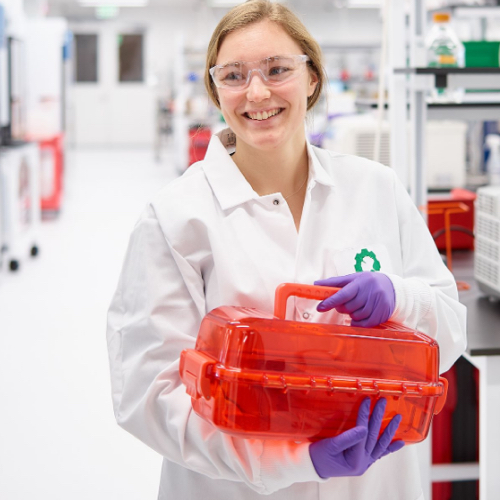Today we’re thrilled to release three announcements centered around our work in sustainability.
- Through our partnership with GreenLab, we will help to discover and develop an enzyme that will be critical to their PFAS degradation application. PFAS, short for “per- and polyfluoroalkyl substances”, bear the moniker of ‘forever chemicals’ owing to their enduring nature and inability to break down in the environment. They are associated with many dangerous health effects including cancer, reproductive and immune system harm, and other diseases. We’re honored to work towards solving solving such a massive and prevalent environmental and health problem with GreenLab.
- Next, the U.S. Department of Energy’s Bioenergy Technologies Office has awarded funding to a Ginkgo-led team to build revolutionary algal crop protection solutions. This project is focused on improving algal biotechnology to enable increased production of affordable biofuels and bioproducts from atmospheric CO2 at large scales.
- And over in Europe, FGen Ag, a Ginkgo subsidiary, has been awarded funding to work on developing a sustainable, alternative approach to milk production using only CO2 and electricity. Utilizing microbial systems — instead of livestock — to produce valuable food ingredients will be critical for sustainable bioproduction of foods, medicines, and chemicals. If successful, the project will enable novel nutrition-focused bioproduction methods that convert atmospheric carbon directly into whey proteins, saving time, energy, and land associated with current practices in the process.
Our platform is enabling our partners to pursue extraordinarily impactful work.
These three different cell engineering programs we’re beginning demonstrate that, more and more, companies and governments are recognizing that synbio is critical climate tech.
Biology is joining other climate technologies because meeting climate goals — and adapting to the already changing climate — requires that we change the way we make almost everything. Emissions reductions in energy and transportation capture headlines and are essential, but to make it to net zero, all sectors will need to decarbonize, particularly chemicals, food, and agriculture. Cell programming is a key tool to reduce industrial emissions.
Advancements on our platform create new opportunities for our customers to produce products that replace those derived from fossil fuels.
We do this by helping enable our partners to use microbes to bio-manufacture chemicals, materials, and fuels using novel, lower-cost, more sustainable feedstocks, such as waste, organic byproducts, or co-products from other industrial processes. As a result, it becomes possible to produce these products with 50% – or even 90% – less emissions than traditional, petrochemical based approaches.
As we embark on these diverse cell engineering programs, it is evident that synthetic biology is increasingly recognized as a vital component of climate technology. Our platform not only empowers partners to tackle environmental challenges head-on but also opens new avenues for sustainable product manufacturing. Together, with our partners, we are proud to contribute to a more sustainable and resilient future, where advancements in biomanufacturing lead the way.
Synthetic biology gives us a key tool to address some of the major societal and environmental challenges the world faces today.
Read our 2022 Sustainability Report, Caring at Ginkgo, detailing Ginkgo’s views and progress towards addressing global challenges, such as climate change and biological threats. It outlines the practices supporting our commitment to thoughtfully deploy our platform, build a diverse and inclusive workforce, and continue to foster a culture of employee ownership.
Biotech is climate tech.
Watch our Foundry Theory episode, where Jake gives an overview of the many ways synthetic biology can help to address the climate crisis. Relevant for anyone driven to make an impact on global carbon.
